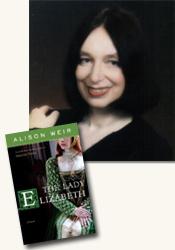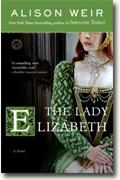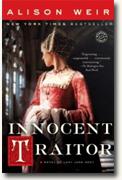author interview
book reviews:
· general fiction
· chick lit/romance
· sci-fi/fantasy
· graphic novels
· nonfiction
· audio books
· author interviews
· children's books @
curledupkids.com
· DVD reviews @
curledupdvd.com
newsletter
win books
buy online
links
home
for authors
& publishiss
for reviewers
The maga Portunista and her colorful subcommanders lead a ragged, outnumbered brigade in the wake of an international war, against her increasingly ruthless adversaries. But the ambitious commander finds herself irreconcilably drawn to a charismatic, kind and hopeful stranger. Click his e for more on Cry of Justice or read our review.
|
|||||
 
Luan Gaines interviewed author Alison Weir about her novel The Lady Elizabeth Interviewer Luan Gaines: In choosing to focus on the early years of Elizabeth’s life in The Lady Elizabeth Alison Weir: Yes, this is obviously the period that shaped Elizabeth, and which holds the most clues to her emotional development and her future greatness. The young Elizabeth is exceptionally intelligent and precocious. How did those qualities attract your attention as you researched this extraordinary woman’s life? I was constantly astonished at her mental dexterity and formidable intelligence. A lot of people find it hard to credit that she was so precocious at a young age, but I can assure you that the evidence for it exists. Daughter of Henry VIII and the beheaded Anne Boleyn, Elizabeth cuts her teeth on power. In the early years, when Henry is still alive and when Edward becomes king, how would you describe Mary and Elizabeth’s relationship? Do their differences become more obvious as each comes closer to her destiny? Prevented by her bastardy and her father’s political machinations from marrying and having children, Mary lavishes her frustrated maternal instincts on her much-younger sister, of whom she is very fond. But as Elizabeth leaves childhood behind and begins to display the flirtatious characteristics of her mother, Anne Boleyn, and embraces the Protestant faith, Mary becomes more wary of her. Any friendship between these daughters of Katherine of Aragon and Anne Boleyn, who are divided by the crucial issue of faith, is inevitably doomed. From childhood, Elizabeth is defiant about marriage. What is the source of this instinctive resistance? Does an ever-changing procession of stepmothers influence the child? No one knows for certain what the source of her reluctance was. There were probably a number of factors. An awareness of her mother’s fate, Katherine Howard’s execution, the divorces and matrimonial controversies within her own family, the deaths of two stepmothers in childbed, and her sister Mary I’s disastrous union with Philip of Spain all probably contributed.
In my novel, Elizabeth is drawn to Kat despite herself, for she initially resents Kat as an interloper after the withdrawal of her first governess, Lady Bryan, who has been more of a mother to her than Anne Boleyn ever was. But she is drawn to Kat not so much for Kat’s maternal qualities as for her sense of fun and her warm and garrulous nature. Secure in Katherine’s household, Elizabeth experiences the first real passion of her young life for Thomas Seymour, an attachment fraught with danger and betrayal. Does Katherine’s husband, the handsome Seymour, truly care for the young girl and does she love him as she believes? Who is guiltier for Elizabeth’s flirtatious relationship with Seymour, Kat, the enabling governess, or the devious Seymour? You’ll have to read the book and decide for yourself if Seymour truly cares for Elizabeth, and if what she feels for him is love! I would say that Seymour himself bears the chief responsibility for his relationship with Elizabeth, but that Kat is to a lesser degree to blame by encouraging it in its later stages. When Seymour pursues Elizabeth after Katherine’s death in childbirth, the queen-to-be finds herself at the center of controversy. How do the intentions of men such as Seymour, and others who later fancy her as wife, cause dangerous complications for Elizabeth during her brother’s reign and that of the Catholic Mary? Elizabeth is heir to the throne after Edward and Mary, and by law she must obtain the Council’s consent before she marries, as must any man wishing to marry her. It would be high treason for her to marry without that consent, and punishable by death. As for seduction… It can’t get more dangerous than that! Religious dissent plagues England after Henry’s death. How do differing religious factions bring disharmony to the country with each new reign? Is not religion at the core of every attempt to overthrow one monarch for another? Religious factions dominated court politics in the latter years of Henry VIII’s reign, after he had broken with Rome and declared himself Head of the Church of England. Henry’s church was Catholic. He burned Protestants for heresy and Catholics for allegiance to the Pope. When Edward VI succeeded him in 1547, the country became officially Protestant, and it was in an attempt to keep it that way that Edward’s advisers set up Lady Jane Grey as queen on Edward’s death in 1553. But Mary, the rightful heir, triumphed, and under her England reverted officially to Roman Catholicism. Mary alienated her subjects by burning three hundred Protestant martyrs, so there was general rejoicing when Elizabeth came to the throne in 1558 and established the Protestant Anglican Church. It seemed to me that Elizabeth’s sojourn at Queen Katherine’s and the nearly disastrous relationship with Thomas Seymour is a seminal point in Elizabeth’s development, balancing ambition with her heart’s impulses. How significant is this period in determining the course of Elizabeth’s life? How does Seymour’s death affect Elizabeth? I should have said that the Seymour episode contributed crucially to Elizabeth's resolve never to marry. It’s intriguing to find that most of the men with whom she became involved later were dark and dashing, even a little dangerous, like Seymour. She kept a tight rein on her emotions on hearing of his death, so we have no way of knowing how deeply it affected her. The bookish, fanatically reformist, young Lady Jane Grey is a victim of the same overreaching ambitions of others that plagues Elizabeth. But Jane eventually loses her head. What does this vile act through Mary’s orders tell Elizabeth about the precariousness of her own situation? Elizabeth now has every reason to believe that she will meet the same fate. And Mary's decision to execute Jane was not so much as vile but rather forced by her advisers. In a way, she was as much a victim of circumstances as Jane was. How significant is William Cecil in Elizabeth’s life? How does he serve her cause even before she is crowned? He was to be her chief counsellor and political adviser for over thirty years. Prior to her accession, he worked covertly for her benefit, much as he is shown doing in the novel. She was always to value his wise advice. Over the years, Elizabeth establishes a tentative peace with Mary. Yet religion always interferes with the fragile peace they maintain. How do Mary’s fears about Elizabeth, fueled by her advisors and Philip of Spain, continually put Elizabeth in danger of being sent to the Tower or worse? Mary is so suspicious of Elizabeth's motives, and so determined that her sister will not succeed her and turn England Protestant that she is always ready to believe the worst of her. And with her advisers dripping vitriol in her ear, Elizabeth's fate is constantly hanging in the balance.
Yes, the daughters are very like their mothers, and the knowledge that Anne Boleyn broke up Mary's mother’s marriage and was a vicious enemy to Katherine and Mary lies between Mary and Elizabeth like a dividing sword. Mary also fears that Elizabeth is not her father’s child, but the bastard of one of Anne Boleyn’s alleged lovers. And Mary is jealous of Elizabeth because she is so much younger and attractive to men. After the interminable investigation about Thomas Seymour and Mary’s constant fears of plots fomented by her sister, Kat is removed from Elizabeth’s household; Elizabeth seems to be more frequently plagued by various ailments and debilitating headaches. Does this pattern of illness continue throughout her life? No, it was chiefly evident in her early years, exacerbated no doubt by the insecurities in her life; it is likely too that some of these ailments were purely diplomatic! Queen Mary: “You are my heir and it is unthinkable that my heir should be of the reformed faith.” How does this statement define Mary’s unwillingness to pass the crown to Elizabeth after her death? What must Elizabeth do to convince her sister? Mary craves Elizabeth's undertaking that she will maintain the Catholic religion in England, but Elizabeth is prepared only to go so far as to swear to uphold the true faith. Mary is aware that she is being deliberately ambiguous, but she knows too that Elizabeth will concede nothing further. The tide is turning and England is looking to its rising star. The fanaticism of the Inquisition is visited on Spain; was it also imported to England through Philip of Spain? What does Mary’s marriage to Philip and the Inquisition portend for those in England who embrace the reformed faith? The Inquisition was never introduced into England, although there were fears that it would be as a result of Mary's marriage to Philip. It was Mary, not Philip, who revived the heresy laws, and Mary who drove the persecution. Knowing that he was blamed for the burnings, Philip did his best to stop them. Many people were concerned that this marriage would turn England into a mere satellite of Spain. When Mary lost Calais after becoming embroiled in Philip’s war, it became clear just how disastrous this marriage had been for England. Philip of Spain, Mary’s husband, sets his sights on a potential marriage with Elizabeth after his wife’s demise. How do such betrayals serve to undermine the relationship between the sisters? In the end, are they not equally alone in their dreams and their fears? Mary fears almost from the first that Philip will be attracted to Elizabeth, not only as a woman, but as a future queen, and that does nothing to improve relations between the sisters. Mary certainly ended up very much alone, her dreams in ruins. Elizabeth's isolation ended with Mary's death, and her dreams were shared by many of her new subjects. In The Lady Elizabeth I’ve made a decision not to discuss this aspect – I want people to read the book! What I will say is that I have written a detailed Author’s Note (which is at the end of the book), supporting what I have written. As a historian, I would not be going down this path! In your role as novelist, what was the most challenging aspect of writing The Lady Elizabeth The most challenging aspect was writing the controversial passages and wondering if they would sound credible. The most rewarding aspect, of course, was getting to know Elizabeth herself all over again, with the luxury of imagining what it would be like to be her. Will you follow up this novel with more about the magnificent Elizabeth? Will that be the topic of your next novel? If not, can you give us an idea of what your new novel will be about? I am at present discussing subjects for further novels with my publishers. I cannot say any more than that at present! Alison Weir is the New York Times bestselling author of the novel Innocent Traitor, and several historical biographies, including Henry VIII, Eleanor of Aquitaine, The Life of Elizabeth, and The Six Wives of Henry VIII. She lives in Surrey, England with her husband and two children. Luan Gaines is a contributing reviewer to curledup.com. Her interview with Alison Weir was written in conjunction with her review of The Lady Elizabeth. © Luan Gaines/2008.
|
|||||
| fiction · sf/f · comic books · nonfiction · audio newsletter · free book contest · buy books online review index · links · · authors & publishiss reviewers |
|
| site by ELBO Computing Resources, Inc. | |


